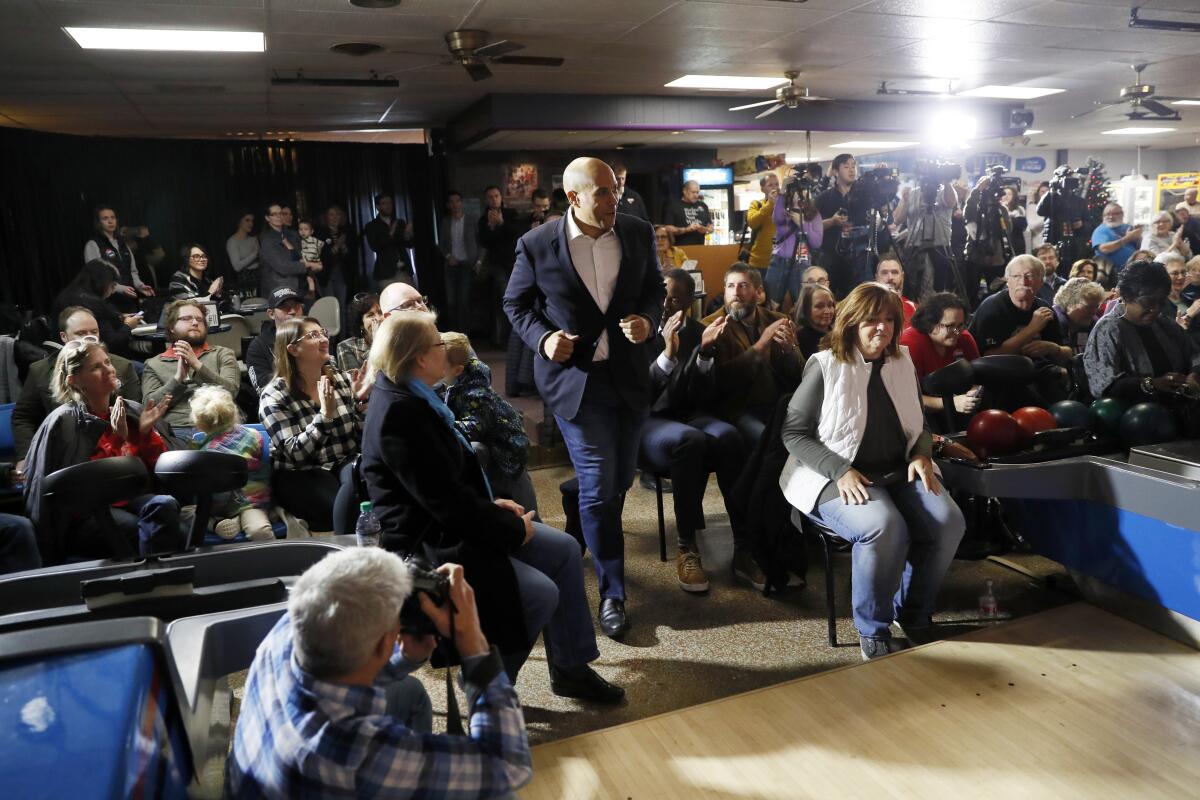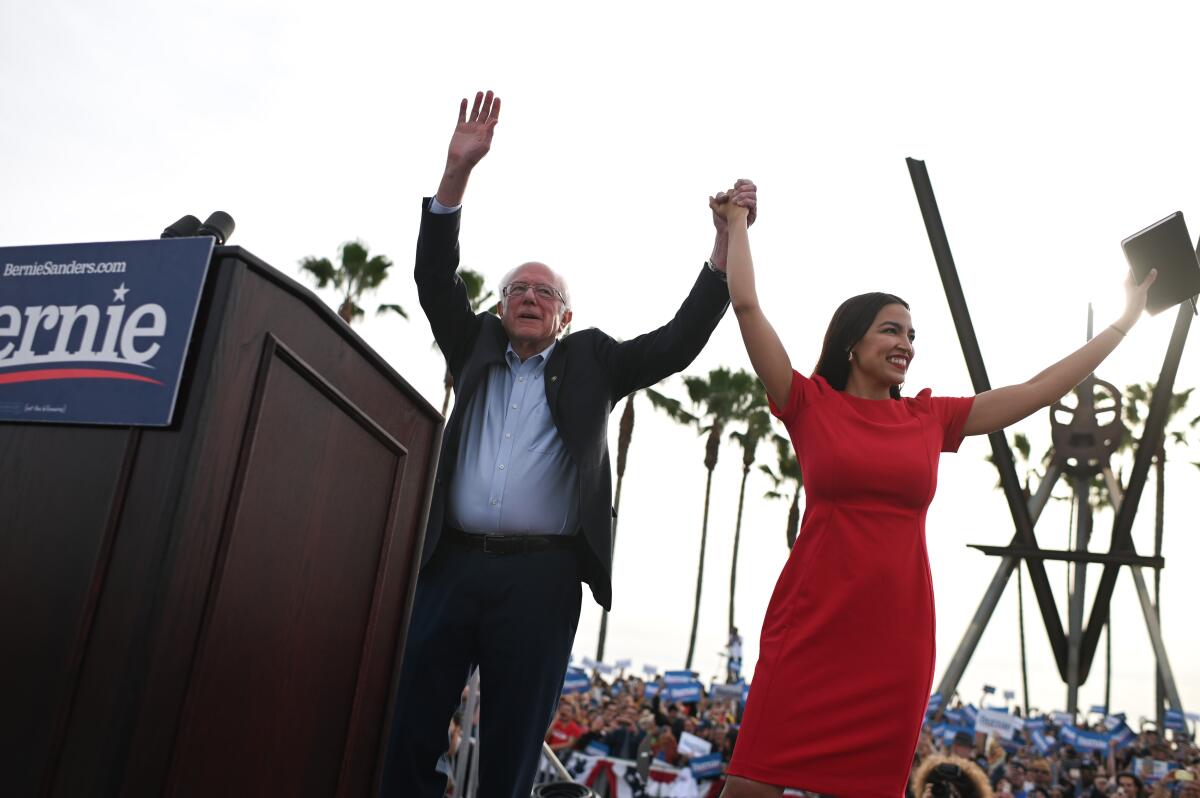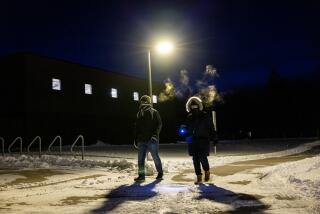Presidential candidates flock to Iowa, where the race is volatile and voters undecided

- Share via
WASHINGTON — With the Democratic presidential nomination still very much up for grabs, candidates sprinted from the year’s final presidential debate in Los Angeles to Iowa this weekend, hoping to get a jump on a frenetic month of campaigning ahead of the state’s Feb. 3 caucuses.
Iowa’s pull, always powerful because it hosts the first contest of the nominating season, is stronger than ever because the race is one of the most volatile in years. Many Iowa Democrats say they are still making up their minds.
“I’ll probably decide in about 45 more days,” said Tami Loge, an Iowa Democrat who attended a rally for New Jersey Sen. Cory Booker in a T-shirt stenciled with the first names of all the Democratic candidates. “Usually I know right away. But there’s so many of them, and they’re all so good. We need to get somebody that’s going to win.”
The waffling may soon end as Iowa’s political pulse quickens after the holidays and voters begin to make their final decisions.
“We’ve gone from the point where people are kicking the tires to the point where they are getting serious about making a commitment,” said Jeff Link, a Democratic strategist in Iowa who is neutral in the race. “We’re in the fourth quarter and everything matters.”
Underscoring the increasing sense of urgency, four of the five top candidates traveled to Iowa for this final weekend before Christmas; the fifth will be there to ring in the new year.
On Saturday, three candidates scheduled events at the same time — 10:30 a.m. — in different parts of the state. Two rivals are scheduled to appear in the same town Sunday.
Stuck in the bumper-to-bumper candidate jam, some are hoping to build on attention garnered from their debate performances — or to heal wounds inflicted by their rivals.
The debate dynamics Thursday were a reflection of the latest pecking order in Iowa. Mayor Pete Buttigieg of South Bend, Ind., who has been topping the field in Iowa polls, came under fire from rivals with the most at stake in taking him down a notch.
Sen. Elizabeth Warren of Massachusetts, who has lost ground to Buttigieg in Iowa, criticized his fundraising practices. Sen. Amy Klobuchar of Minnesota, in a late effort to break into the upper tier in Iowa, attacked Buttigieg’s lack of national political experience.
Sen. Bernie Sanders of Vermont and former Vice President Joe Biden could afford to stand apart from the debate fight because they have relatively stable and strong bases of support in Iowa and other early-voting states.
The average of recent Iowa polls by Real Clear Politics finds 22% of likely Democratic caucusgoers are for Buttigieg, 20% for Sanders, 18% for Biden and 16% for Warren. Klobuchar averaged just 6.3%, but support for her has been on the rise.
Since September, Biden, Warren and Buttigieg have all taken a turn at the top of Iowa polls, leaving the outlook unusually murky.
“The degree of indecisiveness and the willingness of people to consider different candidates, I gotta think it’s at an all-time high,” said Dave Nagle, a former congressman and Iowa Democratic Party chairman who is a veteran of caucus politics. “The last 15 days out here are going to be one earthquake after another.”
One measure of the race’s fluidity: A Des Moines Register/CNN poll in November found that 62% of likely caucusgoers said they could yet be persuaded to support someone other than their current first choice; 30% said they had made up their mind for good.
That’s why Buttigieg, who returns to Iowa on Sunday for two days of campaign events, can take nothing for granted. “The mayor is hot right now,” said Nagle. “The question is, can he sustain it?”
Performing well in Iowa is important for all of the candidates because a strong showing typically boosts a candidate with a burst of attention, donations and momentum heading into other early-voting states.
The Iowa caucuses present a make-or-break moment for candidates who have not yet broken into the top tier, such as Booker, who has polled so poorly that he did not make Thursday’s debate stage.
Klobuchar did make it to the debate, but she is barely hanging on to a spot among the top candidates. She made a splash Thursday and is following up with a four-day, 27-county tour of Iowa this weekend.
Polling by FiveThirtyEight/Ipsos before and after the debate found that Klobuchar had a 4-point increase in the share of respondents who said they were considering voting for her — a bigger increase than any other candidate.
Jean Ulmer, a retiree from Soldier, Iowa, was among those whose head was turned. Ulmer said she had thought she would caucus for Buttigieg. She even had a yard sign planted for him. But she was impressed enough by Klobuchar’s concise, clear answers in the debate that she is giving the senator a second look.
At one of her first events in Iowa on Friday, a jubilant Klobuchar told supporters that her campaign had received $1 million in donations in the 24 hours after her debate performance.
The windfall may not be enough to change her fortunes, however. Her campaign received a similar fundraising boost after the October debate, and she continued to struggle.
Warren came to Iowa on Saturday for two events, seeking to recapture support she enjoyed this fall, when she had her turn topping state polls. She slipped after Buttigieg and others began challenging her and fueling concern that she is too far left to beat Trump.
Speaking to a crowd of about 350 in North Liberty on Saturday, Warren returned to her central argument against the more-moderate agendas proposed by Biden and Buttigieg.
“They think running a vague campaign that nibbles around the edges of these big problems is somehow the safe strategy,” Warren said without naming Biden or Buttigieg. “If the best Democrats can offer is business as usual after Donald Trump, then Democrats will lose.”
Biden, campaigning in Ottumwa on Saturday, also revisited the theme of electability that ran through the presidential debate, arguing that he is the best positioned to beat Trump next fall.
The Des Moines Register/CNN poll in November found that 63% of likely Democratic caucusgoers said their first priority was picking a nominee with a strong chance of beating Trump; 32% said it was more important to pick a candidate who shares their position on major issues.
Campaigning with Biden, former Iowa Gov. Tom Vilsack, who served alongside him in the Obama administration, told the crowd of about 175 that he had checked polls in eight battleground states and found Biden was the only candidate leading or even with Trump in all of them.
“He is the candidate in the best position to win,” Vilsack said. “One thing Donald Trump and I agree on: Joe Biden is the person he is most concerned about.”
Sanders stayed in California after the debate and had a rally in Venice on Saturday afternoon with Rep. Alexandria Ocasio-Cortez of New York.

Sanders — who has held more Iowa events than any of the top candidates except Klobuchar, according to the Des Moines Register tally of events — will return to Des Moines to ring in 2020 at an event billed “Bernie’s Big New Year’s Bash.”
Some Sanders supporters are particularly focused on increasing participation in the caucuses, which are typically low-turnout affairs.
Larry Cohen, a former union leader who chairs Our Revolution, a political organization associated with Sanders, said the group is targeting union members in five eastern Iowa counties that traditionally voted Democratic but flipped to support Trump in 2016.
He estimated that among the group’s 6,000 members in those counties, only about 25% on average participated in Iowa’s caucuses.
The goal is to increase participation to 75% through a program of member-to-member outreach, he said.
Times staff writer Seema Mehta contributed to this report.
More to Read
Get the L.A. Times Politics newsletter
Deeply reported insights into legislation, politics and policy from Sacramento, Washington and beyond. In your inbox three times per week.
You may occasionally receive promotional content from the Los Angeles Times.











